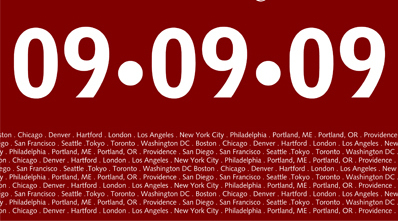今天,2009年9月9日,戀人們爭相到民政局注冊結婚;電影發行方熱力推出新片首映;商家也應景地推出特別促銷活動。這是為什么呢?首先,09/09/09是我們在本世紀看到的最后一個年月日數字都相同的日期,下一次將是2101年1月1日。其次,數字明理學家認為從1到9每個數字都有其獨特的意義,不同的數字組合會在生活中產生明顯不同的影響。作為數字序列中的最后一個數字,9代表寬仁、同情及成功等積極的特質,同時也有傲慢、自負等不太好的意義。古希臘哲學家、數學家畢達哥拉斯也認為9這個數字有很多獨有的特性。例如:9與任意個位數相乘得到的兩位數,這個兩位數的兩個數字相加的結果肯定是9,如,9×3=27,2+7=9。此外,9在中國一直都是“長久”的代表數字,09/09/09這個日期對很多人來說都預示著“長長久久”之意。不過,在日本,9代表的卻是苦難,人們在生活中都會避免使用這個數字。

|
 |
|
Though technically there's nothing special about the symmetrical date, some concerned with the history and meaning of numbers ascribe powerful significance to 09/09/09. |
Everyone from brides and grooms to movie studio execs are celebrating the upcoming calendrical anomaly in their own way.
In Florida, at least one county clerk's office is offering a one-day wedding special for $99.99. The rarity of this Sept. 9 hasn't been lost on the creators of the iPod, who have moved their traditional Tuesday release day to Wednesday to take advantage of the special date. Focus Features is releasing their new film "9," an animated tale about the apocalypse, on the 9th.
Not only does the date look good in marketing promotions, but it also represents the last set of repeating, single-digit dates that we'll see for almost a century (until January 1, 2101), or a millennium (mark your calendars for January 1, 3001), depending on how you want to count it.
Though technically there's nothing special about the symmetrical date, some concerned with the history and meaning of numbers ascribe powerful significance to 09/09/09.
For cultures in which the number nine is lucky, Sept. 9 is anticipated - while others might see the date as an ominous warning.
Math magic
Modern numerologists - who operate outside the realm of real science - believe that mystical significance or vibrations can be assigned to each numeral one through nine, and different combinations of the digits produce tangible results in life depending on their application.
As the final numeral, the number nine holds special rank. It is associated with forgiveness, compassion and success on the positive side as well as arrogance and self-righteousness on the negative, according to numerologists.
Though usually discredited as bogus, numerologists do have a famous predecessor to look to. Pythagoras, the Greek mathematician and father of the famous theorem, is also credited with popularizing numerology in ancient times.
"Pythagoras most of all seems to have honored and advanced the study concerned with numbers, having taken it away from the use of merchants and likening all things to numbers," wrote Aristoxenus, an ancient Greek historian, in the 4th century B.C.
As part of his obsession with numbers both mathematically and divine, and like many mathematicians before and since, Pythagoras noted that nine in particular had many unique properties.
Any grade-schooler could tell you, for example, that the sum of the two-digits resulting from nine multiplied by any other single-digit number will equal nine. So 9x3=27, and 2+7=9.
Multiply nine by any two, three or four-digit number and the sums of those will also break down to nine. For example: 9x62 = 558; 5+5+8=18; 1+8=9.
Sept. 9 also happens to be the 252nd day of the year (2 + 5 +2)...
Loving 9
Both China and Japan have strong feelings about the number nine. Those feelings just happen to be on opposite ends of the spectrum.
The Chinese pulled out all the stops to celebrate their lucky number eight during last year's Summer Olympics, ringing the games in at 8 p.m. on 08/08/08. What many might not realize is that nine comes in second on their list of auspicious digits and is associated with long life, due to how similar its pronunciation is to the local word for long-lasting (eight sounds like wealth).
Historically, ancient Chinese emperors associated themselves closely with the number nine, which appeared prominently in architecture and royal dress, often in the form of nine fearsome dragons. The imperial dynasties were so convinced of the power of the number nine that the palace complex at Beijing's Forbidden City is rumored to have been built with 9,999 rooms.
Japanese emperors would have never worn a robe with nine dragons, however.
In Japanese, the word for nine is a homophone for the word for suffering, so the number is considered highly unlucky - second only to four, which sounds like death.
Many Japanese will go so far as to avoid room numbers including nine at hotels or hospitals, if the building planners haven't already eliminated them altogether.
相關閱讀
(Agencies)

(英語點津 Helen 編輯)